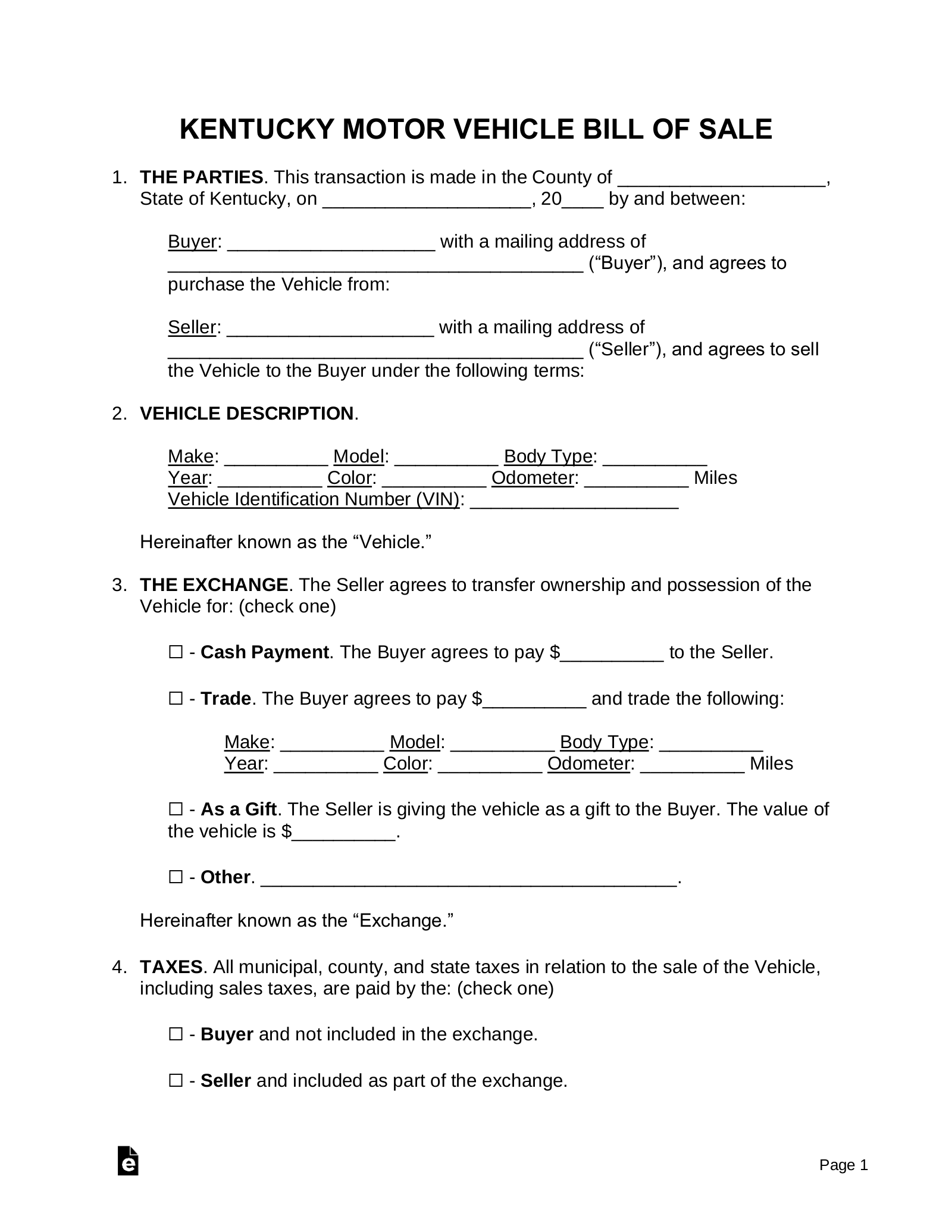Navigating the ins and outs of buying or selling personal property can sometimes feel like a complex puzzle. Whether you’re purchasing a car, a boat, or even a valuable piece of furniture, having the right documentation is crucial for both parties involved. It’s not just about shaking hands and exchanging money; it’s about creating a clear, legal record of the transaction.
This is where a bill of sale comes into play. Think of it as your official receipt and agreement rolled into one, detailing the specifics of what was sold, to whom, for how much, and when. For residents of the Bluegrass State, understanding the nuances of this document is especially important to ensure smooth transfers and avoid future misunderstandings.
Why You Need a Kentucky Bill of Sale
A bill of sale isn’t just a formality; it’s a vital legal document that protects both the buyer and the seller. For the seller, it provides proof that the item has been transferred out of their possession, absolving them of future liability, especially in cases like vehicle sales where previous ownership could still be linked to parking tickets or accidents. It formally marks the end of their responsibility for the item.

On the buyer’s side, a bill of sale serves as undeniable evidence of ownership. This proof is often required for various purposes, such as registering a vehicle with the county clerk, obtaining a new title, or even insuring the purchased item. Without it, you might find yourself in a tricky situation trying to prove you lawfully acquired the property, especially if there’s ever a dispute or theft involved.
Beyond legal protection, the document also provides a clear record of the transaction’s terms. It outlines the agreed-upon price, the condition of the item at the time of sale, and any warranties (or lack thereof). This transparency helps prevent disagreements down the line, as all parties have a written reference to consult if questions arise about the initial agreement.
For significant purchases, particularly those requiring state registration or title transfer in Kentucky, having a properly executed bill of sale isn’t just recommended, it’s often a mandatory step in the process. It’s the lynchpin that connects the old owner to the new, ensuring a seamless and legally sound transition of property rights.
Essential Information on Your Kentucky Bill of Sale
- Full names and addresses of both the buyer and the seller.
- The date the sale officially took place.
- A detailed description of the item being sold, including make, model, year, color, and any unique identifiers like a Vehicle Identification Number (VIN) for cars or a Hull Identification Number (HIN) for boats.
- The agreed-upon purchase price, clearly stated in numerical and written form.
- A declaration that the item is being sold “as is,” if applicable, meaning the buyer accepts it with all existing faults.
- Signatures of both the buyer and the seller.
- (Optional but often recommended) Signature of a witness or a notary public, especially for high-value items or when required by specific regulations.
How to Use and Obtain a ky bill of sale template
Finding a reliable ky bill of sale template is easier than you might think. Many government websites, particularly those for Kentucky’s motor vehicle department or county clerk offices, often provide downloadable forms. You can also find reputable legal document websites that offer customizable templates specifically designed for various types of sales, from vehicles to general merchandise. Always ensure the template you choose is compliant with Kentucky state laws to avoid any future headaches.
Once you have your template, filling it out accurately is paramount. Take your time and ensure every piece of information is correct. Double-check names, addresses, and especially the description of the item and the purchase price. Any discrepancies could invalidate the document or lead to complications later on. It’s often a good idea to have both parties present when filling out and signing the form to ensure mutual agreement on all terms.
After the form is completed and signed by both the buyer and the seller, it’s crucial to make copies. Each party should receive an original signed copy for their records. This ensures that both sides have a legal reference should they ever need it. For vehicle sales, the buyer will typically need their copy to register the vehicle and obtain a new title from the county clerk’s office.
While a bill of sale is most commonly associated with vehicle sales, it’s a versatile document that can be used for various types of personal property. Even for items that don’t require state registration, using a ky bill of sale template provides a clear record of the transaction, offering peace of mind and protection against potential disputes. It formalizes the transfer of ownership, making the transaction clear and legally sound for everyone involved.
Ultimately, taking the extra step to use a bill of sale ensures that your transactions are transparent, legally sound, and free from future complications. It’s a small investment of time that can save you significant hassle and provide clarity for years to come. By documenting your sales properly, you’re not just completing a transaction; you’re building a foundation of trust and legality.



